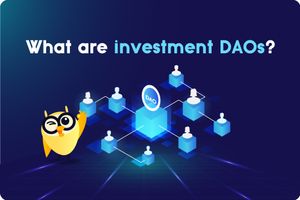We’ve covered topics such as DeFi and different crypto investment options in previous blog articles.
👀 In this blog post, we’ll take a closer look at investment DAOs and explain what they are, how they work, how they compare to traditional venture capital (VC) funds, as well as their pros and cons.
❓ WHAT IS A DAO?
👉 Decentralized Autonomous Organizations (or DAOs) are essentially organizations governed by smart contracts 📄 – self-executing pieces of code that run on a blockchain. Members within a DAO can deliberate, discuss proposals and make decisions that are executed using smart contracts. In effect, a DAO can function without human maintenance and run continuously once set up as it is immutable.
The most common way voting mechanisms operate within a DAO is through governance tokens 🪙. The more governance token an individual owns, the more voting power and influence they have in the decision-making process. Some DAOs allow any member to make a proposal, while others may limit this right to a specific group.
DAOs are commonly used to manage DeFi projects, blockchains and other protocols in the crypto space.
❓ WHAT EXACTLY ARE INVESTMENT DAOs?
💰 Investment DAOs are created to raise funds from its members, and to invest that capital in different assets and projects on their behalf. These projects are usually blockchain-based. They can range from crypto companies, cryptocurrencies, digital assets like NFTs, NFT collections and metaverse real estate. Investments selected can often be innovative startups.
Investment DAOs tap into the power of web3 to democratize the investment process and leverage the capabilities it offers to make the decision process more inclusive. This introduces equitability and democracy to the investment process.
❓ HOW DO INVESTMENT DAOs WORK?
Every investment DAO follows a specific principle or goal. For example, some DAOs prefer investments in particular industry segments, such as DeFi or GameFi protocols. Investment decisions made depend on the supported principles, verified through a proposal mechanism.
📊 Once a proposal is made, DAO members will either stake their tokens or use a snapshot mechanism to exercise their voting rights. A snapshot looks at the number of governance tokens in each wallet and distributes voting rights based on that without locking the tokens. This helps avoid users swaying the vote by buying more tokens once they've seen a proposal. Once voting is over, the decision is implemented according to the results.
🎁 Profits from investments are distributed either via airdrops to governance token holders or through a staking mechanism. By staking their governance token, members can receive a share of rewards that they can elect to withdraw from the smart contract.
👥 Investment DAOs often run active community channels on Discord and Telegram to help organize, inform, and facilitate their proposals. A DAO is only as successful as its community, so it needs to maintain a healthy and active membership.
⚠️ ISSUES WITH TRADITIONAL VCs
Venture capital funds (VCs), founded and managed by general partners (GPs), are part of the capital pyramid. They act as a conduit that efficiently sources capital from large institutions like pension funds and endowments, family offices and individuals, called limited partners (LPs), and deploy that capital into portfolio firms.
Traditional VCs have successfully catalyzed the growth of the internet, social media and many web2 giants over the past three decades. However there are several challenges posed such as:
- Exclusivity – the amount of capital involved and risk profile of the asset class make the VC model often only viable for sophisticated investors.
- Centralization – investment decisions are generally limited to small groups that sit on the investment committee of a VC fund.
- Illiquidity – capital deployed into these VC funds is often locked in for years, making it an illiquid asset class.
📋 TRADITIONAL VCs vs INVESTMENT DAOs
Investment DAOs directly address these issues.
| Issue | Traditional VCs | Investment DAOs |
|---|---|---|
| Inclusivity | Low | High |
| Liquidity Risks | High | Low |
| Governance | Centralized | Decentralized |
| Global Participation (LPs) | Low | High |
| Regulatory Risks | Low | High |
| Legal Seamlessness | High | Low |
✔️❌ INVESTMENT DAOs – ADVANTAGES, OPPORTUNITIES & RISKS
✔️ DAOs bring together web3 ethos and the operational seamlessness of smart contracts. Investors that believe in a specific investment can come together to pool capital and form a fund.
Investment DAOs allow accredited investors to contribute in all sizes, granting them inclusive access. Tokenized investment DAOs address the issue of liquidity by having a token that derives its value from the underlying portfolio. These benefits make them a better investment vehicle than VCs based on the risk-return profile.
❌ Risks posed by Investment DAOs include poor investment decisions resulting in a loss of funds, smart contract failure due to bad actors exploiting poor coding, and mismanagement that could lead to a decline of the fund.
🌟 Investment DAOs are still works in progress and their model shows promise. They could be the model that traditional VCs embrace once the legal and regulatory risks are ironed out.
The information provided on this website does not constitute investment advice, financial advice, trading advice, or any other sort of advice and you should not treat any of the website's content as such. Bloom does not recommend that any cryptocurrency or NFTs should be bought, sold, or held by you. Do conduct your own due diligence and consult your financial advisor before making any investment decisions.
